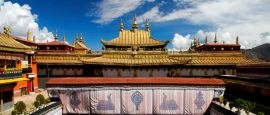Tibet Health Care and Vaccinations
Medical infrastructure is poor in Tibet and services are almost non-existent in rural areas outside of Lhasa. Medical insurance is strongly advised and should include evacuation insurance. The nearest recommended medical facilities are in Chengdu and Kathmandu. Traditional Tibetan medicinal treatments are available in Lhasa.
All water used for drinking, brushing teeth or freezing should first be boiled or otherwise sterilised. Bottled water is widely and cheaply available. Be especially careful when eating at small street-side stalls or restaurants where standards of hygiene may not be high. Vegetables should be cooked and fruit peeled.
Altitude sickness is a serious risk in Tibet. Symptoms range from breathlessness and headaches to lack of coordination and vomiting and can occur at any elevation over around 3000m (almost everywhere in Tibet). It is extremely important to allow several days in Lhasa to acclimatise. For travel outside Lhasa arrange your itinerary so that you don't gain more than 500m of altitude per day. As with other parts of China hepatitis B is endemic. Sporadic outbreaks of avian influenza (bird flu) have resulted in a small number of human deaths. Rabies is present and a concern if travelling or trekking through rural parts of Tibet. If bitten, medical advice should be sought immediately.
Do you have any Feedback about this page?
© 2025 Columbus Travel Media Ltd. All rights reserved. No part of this site may be reproduced without our written permission, click here for information on Columbus Content Solutions.








 You know where
You know where